MedNet Events
Upcoming events
Network Meeting
24 July 2024 15:00 CEST, Barcellona
The meeting will take place at the EASA2024 Conference, Facultat de Geografia i Història 222.
Past events
Crossing the divide: Exploring Mediterranean places across Mediterranean, European and Middle Eastern Anthropology
26th to 28th October 2023, Salle Duby, Maison Méditerranéenne des Sciences de l’Homme, Aix-en-Provence, France
Keynotes: Dionigi Albera (IDEMEC - CNRS)
Ruba Salih (Alma Mater Studiorum - University of Bologna)
Workshop theme
Mediterranean Anthropology, European Anthropology and Middle Eastern Anthropology study
overlapping areas of the Mediterranean region. Reflecting geopolitical divisions of the area, the three
regional traditions have over the years developed their own theoretical concerns, ethnographic concerns,
and political-ethical agendas. The 2023 MedNet workshop1 seeks to cross the traditional disciplinary
division between the Southern, Eastern and Northern shores in order to foster productive intellectual
crossings and ethnographic cross-pollination. We ask: how can we advance anthropology in and of the
Mediterranean by bringing different regional traditions into closer conversation?
Following older and recent calls to expand the horizon of anthropology in the Mediterranean regions, the
aim of the MedNet workshop is to consider how the exercise of anthropology in the Mediterranean has
been shaped by disciplinary paths, institutional configurations, as well as by foreign policies. To facilitate
our thinking across and along intellectual, geographical and imaginary boundaries, we introduce
“crossings” as an analytical concept. “To cross” means to "go or extend across or to the other side of," often
in relation to a stretch of land or water. But “to cross” can also refer to an intersection of routes that does
not result in a joint path. The concept’s ambiguity – a crossing can be geographical, legal, institutional, or
intellectual; it can be generative, leading to a new position, or result in non-generative overlaps – invites
us to trace crossings of different natures and outcomes.
Through the workshop, we hope to learn more about the geopolitics, economic conditions, social-cultural
lives, and intellectual circumstances that have contributed to the formation and maintenance of the predicaments – dysfunctional rule, socio-economic precarity, postcolonial cartographies and
environmental degradation – have played out on the ground, been imagined and intellectually
conceptualized across the shores. We are also curious about methodological crossovers - be they
academic, artistic or quotidian – that either render Mediterranean spaces and routes in novel ways or
seek out the perspectives of interlocutors and institutional frameworks.
EASA2022, School of History, Anthropology, Philosophy and Politics at Queen’s University Belfast
Convenors: Gabriele Orlandi (Aix-Marseille Université), Panas Karampampas (Panteion University of Social and Political Sciences), Paula Escribano (University of Barcelona)
This panel encourages an anthropological perspective on public policies, considering them as spaces of negotiation, inclusion, and hope, as well as social actants resulting in violence and exclusion. Moreover, by looking at the Mediterranean it allows a narrow and novel comparative perspective.
Mediterranean Interconnectivity: Mobility of persons, goods, ideas across (and beyond) the Mediterranean Sea
2021 EASA Mediterraneanist Network (MedNet) workshop (British School at Athens, 11-13 November 2021)
The 2021 MedNet Workshop Programm can be downloaded here
The keynote of Dr Elisabeth Kirtsoglou (Durham University) on Tuesday 11 November and the workshop panels on Friday 12 November and Saturday 13 of November were streamed online.
Jutta Lauth Bacas - (University of Malta)
Carlo Capello - (University of Torino)
Panas Karampampas - (Uinversity of Thessaly)
Organisers and MedNet Co-Convenors
P002: Works and lives: new perspectives on economy and livelihoods in Mediterranean Anthropology
EASA2020, ISCTE-University Institute of Lisbon and ICS-Institute of Social Sciences, University of Lisbon, virtual conference
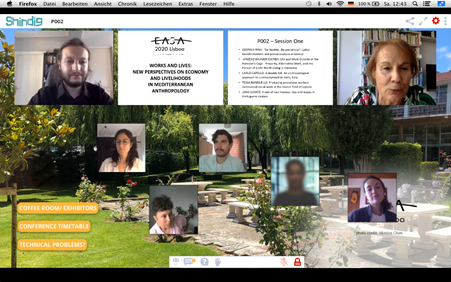 MedNet, an EASA network active since 2004, brings together social anthropologists
doing research in countries bordering the Mediterranean Sea. In 2020, MedNet
organized a panel at the 16th EASA biennial conference. The Panel (P002) with title: Works and Lives. New perspectives on economy and livelihoods in Mediterranean Anthropology was convened by the MedNet Convenors.
MedNet, an EASA network active since 2004, brings together social anthropologists
doing research in countries bordering the Mediterranean Sea. In 2020, MedNet
organized a panel at the 16th EASA biennial conference. The Panel (P002) with title: Works and Lives. New perspectives on economy and livelihoods in Mediterranean Anthropology was convened by the MedNet Convenors.
The panel with two sessions focussed on the impact of neoliberal and austerity policies in the Mediterranean area and beyond, with special attention to changing labour regimes, precarity, unemployment and informal labour. Through this, it will highlight the new horizons developed in Mediterranean Anthropology.
At the MedNet panel the following questions were discussed: The impact of neo-liberal and austerity policies on both shores of the Mediterranean; the effects of the transformation and multiplication of labour regimes; the experience of precarity and informal economy; adult and youth unemployment, its relation with deindustrialization and the growing precarisation of labour; gender pay gaps; the complex relations between irregular migration, the informal labour market and the social entitlement to benefits offered by the Welfare State. During two well attended session nine papers were presented and intensively debated.
Also during the 2020 EASA conference, the MedNet network held its biannual network meeting. After a report on activities in 2019 given by Jutta Lauth Bacas and Panas Karampampas, mainly reporting on the 2019 MedNet Workshop in Turin . Then, the Mednet members present at the online-meeting revalidated the current convenors to run the network for another turn. The 2018 MedNet network meeting finished with a short presentation of the latest publications of some its members.
Currently, the MedNet convenors are preparing the 2021 MedNet Workshop, which will be hosted by the British School at Athens in November 2021. A Call for Papers with more detailed information will be circulated at a later point. Moreover, they are preparing the forthcoming special issue “The Future(s) of Mediterraneans between uncertainty and resilience” based on papers presented during the 2029 MedNet Workshop that it will be published in the journal Etnoantropologia in June 2021.
(The P002 panel video is available for paid up delegates on the EASA web site/panel description.)
 The future(s) of the Mediterranean between uncertainties and resilience
The future(s) of the Mediterranean between uncertainties and resilience
24 - 26 October 2019, Turin University, Italy
2019 EASA Mediterraneanist Network (MedNet) Workshop.
In contrast to some public discourses, which see Mediterranean societies associated with backwardness or which focus mainly on the current economic and political crisis of Mediterranean region, we want to introduce a fresh approach. In this workshop, we approach the Mediterranean as a place in which new ideas and understandings of future(s) are arising as people are trying to find ways to face the uncertainties in their lives.
Panel P072: Hospitality and its reverse: Migration and xenophobia in Southern Europe and beyond
EASA2018 Stockholm
Convenors: Jutta Lauth Bacas (Convenor of MedNet) & Carlo Capello (University of Torino)
The massive arrival of boat migrants and refugees in Mediterranean countries has given way to both hospitality and to growing xenophobia. Panel P072 will discuss: What are causes and consequences of such increasing xenophobic feelings occurring in reception countries? And how are grassroots hospitality and the official migration apparatuses locally organised?
Wind of Change: Politics, Economy, Ethnicity in the Mediterranean
2017 MedNet workshop
University of Lisbon, 2nd – 4th November 2017
Workshop convenors: Dr Jutta Lauth Bacas, Fellow, Royal Anthropological Institute
Murilio Giumaraes, Institute of Social Sciences, University of Lisbon (ICS-UL).
Focusing on circumstances and conditions of change, the 2017 MedNet Workshop brought together members of the EASA MedNet Network in an open forum with scholars and colleagues from the Institute of Social Sciences of the University of Lisbon (ICS-UL).
Read the full workshop report here ![]() .
.
Panel 010: Patronage-clientelism 2.0: the legacy of Mediterraneanist anthropology in contemporary corruption/anti-corruption studies
EASA2016 Milan
Convors: Jutta Lauth Bacas (MedNet) and Dorothy L. Zinn (Free University of Bozen-Bolzano)
Panel P005
Networking, collaboration and intimacy in the Mediterraneans
EASA 2014, Talinn
Convenors:
Jutta Lauth Bacas (Academy of Athens)
Young and advanced scholars presented their research on social practices of networking, cooperation and resistance
in cases like the Italian feminist movement, Greek’s resistance to water privatization in the aftermath of the
economic crisis and the ‚Open Theatre’ as political action in Athens.
Network business meeting
EASA 2014, Talinn
In memory of
William Kavanagh
During the 13th EASA Biennial Conference, MedNet also organized
a Network Meeting, which was dedicated to the memory of its co-convenor, the late William Kavanagh (CEU University
Madrid). After the unexpected passing of William Kavanagh on 29th of April 2014, an acknowledgement of his work and
academic commitment was presented in Tallinn. William Kavanagh was a leading figure in the network since its very
beginning, to which he contributed with his knowledge, humour and personal warmth. His death is a great loss for the
Mediterraneanist Network of EASA and for the discipline as a whole.
Connecting spaces, constructing places, constituting memories: Comparative approaches in the anthropology of
the Mediterranean
6th Workshop of the EASA Mediterraneanist Network
31 Oct. – 3 Nov. 2013, Mediterranean Institute, University of Malta
The workshop sessions focused on the following aspects:
A. Connecting spaces: Connectivity has been seen as one of the main features of Mediterranean societies and cultures since the work of Braudel and, more recently, that of Horden and Purcell. Evaluations may critically reflect on these contributions or focus on other forms of mobility of goods and people and recent phenomena of connectivity, such as migration, networks or border encounters.
B. Constructing places: Another focus of comparative analysis and discussion was the multiple ways of constructing and perceiving places in the Mediterranean and giving meaning to them through changing social and cultural practices, such as the ‘sharing’ of shrines in the Mediterranean by different religions.
C. Constituting memories: Also welcomed in the forthcoming MedNet workshop was the studies of perceived continuity and tradition and the analysis of processes of constituting memories of shared experiences and conflicts in the Mediterranean as a region of comparison.
(W069) Uncertainty and disquiet in
the Mediterranean region
5th Workshop of the EASA Mediterraneanist Network
EASA 2012 conference at Nanterre University
Reflecting Anthropological Fieldwork in the Mediterranean Area
4th Workshop of the EASA Mediterraneanist Network
Ca’ Foscari University, Venice, 27 - 29 October 2011

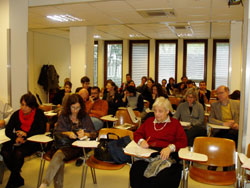
Venice workshop participants
After two successful inter-conference scientific meetings at Catania (2007) and Athens (2009) and a workshop held during the EASA 2010 Maynooth conference, the fourth scientific workshop of the EASA Mediterraneanist network (MedNet), organised in cooperation with the Ca’Foscari University of Venice, brought together members of EASA’s Mediterraneanist network in an open forum to evaluate recent research along with scholars from the host university, with the goal of deepening the cooperation between anthropologists doing fieldwork in the Mediterranean area.
The theme of the workshop was formulated in a broad sense focusing on ‘Reflecting Anthropological Fieldwork in the Mediterranean Area’. The focus on fieldwork was intended to provide an open framework for various contributions by MedNet members, presenting either their recent research projects or their reflections on fieldwork experiences in the Mediterranean region.
The reply to our Call for Papers for this 4rd MedNet workshop in Venice was very positive, enabling the conveners to organize the largest workshop in the annals of MedNet, with a total of twenty-five papers presented, including a keynote by Dr Lidia Sciama (Oxford University). The seven working sessions were well attended by more than fifty participants, including local colleagues and doctoral students from the host Ca’Foscari University and neighbouring Padua University.
It is also important to mention here that the EASA Executive Committee was able to provide financial support for this 4th MedNet scientific workshop. This gave MedNet the opportunity to support junior scholars with travel funding in order to participate in the meeting.
Workshop Programme
Keynote lecture by Lidia Sciama (University of Oxford): Rethinking the Mediterranean: Topos or Mirage?

Keynote speaker Lidia Sciama
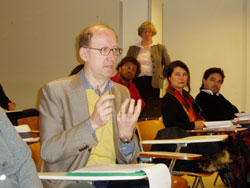
Pier Paolo Viazzo makes a point
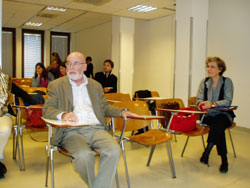
Moshe Shokeid and Maria Couroucli listen
FIRST WORKING SESSION: Theoretical Orientations
Pier Paolo Viazzo and Paola Sacchi (University of Turin): Honour, history and the history of Mediterranean anthropology
Dorothy L. Zinn (Free University of Bozen-Bolzano): Power, Corruption and Reflexive Truths: A Reprise of ‘Mediterranean’ Patronage
Antonio Maria Pusceddu and Francesco Bachis (University of Cagliari): Mobilities, boundaries, religions: some provisional remarks on comparative research in the Mediterranean
SECOND WORKING SESSION: Reflecting fieldwork in the Mediterranean region I
William Kavanagh (CEU San Pablo University, Madrid): Two Countries, Three Decades, One Anthropologist: Reflections on Fieldwork in Spain and Portugal
Maria Couroucli (CRNS Paris and French School at Athens): The Otherness among Mediterranean countrymen: re-visiting religious frontiers
Florence Ménez (EHESS Paris): Les conséquences de l’introduction de la palourde des Philippines dans la Lagune de Venise: étude ethnologique
THIRD WORKING SESSION: Reflecting fieldwork in the Mediterranean region II
Jasmin Habib (University of Waterloo): On the Matter of 'Return': Autoethnographic Reflections
Eva Carlestål (University of Linkoping): Reflections on reflexivity: a place of remembrance
Carlo Capello (University of Turin): Southern Italy’s Double Face: A Critical Reflection
FORTH WORKING SESSION: Intercultural encounters and identity formation I
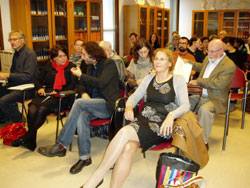 One of the parallell working sessions
One of the parallell working sessions
Marion Krüger (University of Tübingen): Doing fieldwork about flamenco in Granada – body, gender and social spaces: crossing and experiencing boundaries
Ilaria Verratti (EHESS Paris): Demonstrating Marginal Identity: A Case Study from the Berber Culture
Anna Tozzi Di Marco (University of Rome): Seven Sleepers legend and cult in the Mediterranean area:
A comparative analysis of the cult among the different Muslim sites
Manoël Pénicaud (MMHS Aix-en-Provence): The Seven Sleepers in the Mediterranean: ‘Reawakening’ experiences of a Christian-Muslim tradition
FIFTH WORKING SESSION: Intercultural encounters and identity formation II
Sina Lucia Kottmann (University of Tübingen): Cross and crescent above Western Mediterranean skies: challenges and findings of ethnographic fieldwork on Muslim-Christian encounters in Andalusia
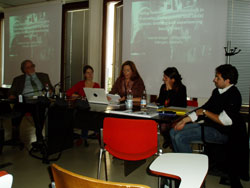 Another
working session
Another
working session
Erica Ianiro (Ca’ Foscari University, Venice): A multiple-choice of self identity: To be a merchant in the East Mediterranean at the end of the modern age
Susanne Dahlgren (Helsinki Collegium for Advanced Studies): Sectarian violence, colonialism and making anthropology in the past: A case study from the British colony of Aden
SIXTH WORKING SESSION: Migration in the Mediterranean I
Jutta Lauth Bacas, (Academy of Athens): Not allowed to stay, not allowed to leave: The double dilemmas of EU Migration Policy and of boat refugees in Patras, Greece
Paul Clough (University of Malta): Narratives about Self and Other among African Immigrants in Malta
Moshe Shokeid (Tel Aviv University): Israeli Social Scientists in the Service of Immigrant Absorption
SEVENTH WORKING SESSION: Migration in the Mediterranean II
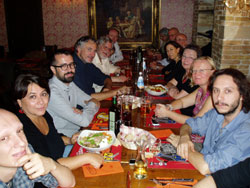 Workshop participants
relax in the evening
Workshop participants
relax in the evening
Francesco Vacchiano (CRIA-IUL, Lisbon) with Mercedes Jiménez (Autonomous University of Madrid): Photo journey: Fortifying south. New border apparatuses in the Gibraltar space
Francesco Bondanini (University of Granada): Life (arrested) between boredom and loneliness: fieldwork on Europe’s frontier of Melilla
Gianfranco Bonesso (Ca’ Foscari University, Venice): From the Balcans to Mestre. Routes, changes and cultural persistence of Macedonian migration
Rosa Parisi (University of Foggia): La Mediterranée: familles et migration: le couples mixtes comme forme de famille transnationale
A selection of papers presented at the 4th MedNet workshop in Venice are to be published as a special issue of the Journal of Mediterranean Studies (2013) edited by Jutta Lauth Bacas, William Kavanagh and Paul Clough.
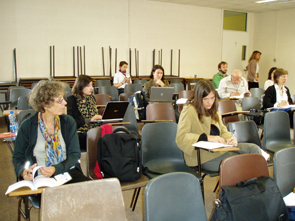 MedNet workshop at EASA 2010, Maynooth
MedNet workshop at EASA 2010, Maynooth
Understanding Mediterranean transit
migration
3rd workshop of the EASA Mediterraneanist Network
EASA 2010, Maynooth (24 – 27 August 2010)
MedNet, the Mediterraneanist Network of EASA, held a scientific workshop at the EASA 2010 conference in Maynooth with the aim of understanding the social dimensions of clandestine migration across the Mediterranean by examining the experiences and social profiles of irregular migrants and the responses of the nation-states involved.
 Maynooth workshop –
Discussant Maria Couroucli
Maynooth workshop –
Discussant Maria Couroucli
The workshop took as its starting point that currently a global trend of south-north irregular migration can be observed, especially strong in present cross-Mediterranean migration. Attempts to map transit migration in the Mediterranean area identify typical routes in the west (between Morocco and Spain), in the centre (between Libya and Italy) and in the east (between Turkey and Greece). Whereas these typical routes of clandestine migration across the Mediterranean Sea are quite well documented, a clearer understanding of the social dimension of this irregular transit migration is still lacking. Little is known about the social profile of irregular migrants arriving at various European shores, of their gender or age composition, their motives for migrating and especially their often traumatic experiences of clandestine border crossing. Furthermore, the political responses of the nation-states involved might vary over time in relation to increasing numbers of undocumented migrants arriving at or passing through their national territories. By narrowing down the focus of analysis to a specific geopolitical region (here the Mediterranean basin), our understanding of the phenomenon of irregular migration can be contextualized and deepened by a comparative approach.
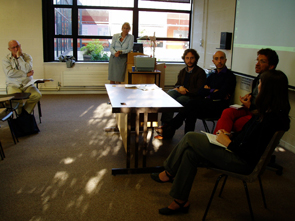 Maynooth workshop – Roundtable discussion
Maynooth workshop – Roundtable discussion
Based on empirical research with transit migrants in the Mediterranean area, the following papers were presented and discussed during the MedNet workshop:
FIRST WORKING SESSION
Jutta Lauth Bacas (Academy of Athens): The puzzle of Mediterranean transit migration.
William Kavanagh (CEU San Pablo University, Madrid): Imagining the frontier: European state borders, globalizing migration theory and the lived worlds of migrants.
Anitta Kynsilehto (University of Tampere): 'I would have never imagined travelling like this': journeys towards and across Europe.
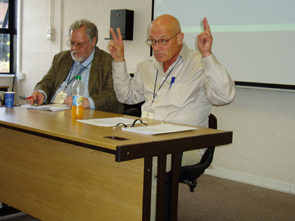 Maynooth workshop –
Paul Clough makes a point
Maynooth workshop –
Paul Clough makes a point
SECOND WORKING SESSION
Paul Clough (University of Malta): Narratives of self and other in migration trajectories.
Francesco Bruno Bondanini (Universidad de Granada): Studying immigrants' identities on the frontiers of Europe.
Azita Bathaïe (University Paris Ouest Nanterre la Defense): The Afghan migrants from the frontiers of Iran to Europe.
Didem Danis (Galatasaray University): Transit migrants in Turkey shuffling between categories.
THIRD WORKING SESSION
Carlo Capello (University of Turin): The social context of hrigue: a Moroccan view
Inka Stock (University of Nottingham): Bringing up children in transit: the life of African migrant women with their children in Morocco.
Francesco Vacchiano (CRIA Lisbon): Children on the wave: minors, migration, and the new European 'southern frontier'.
Francesco La Rocca (CEMDAI, Catania): Between Libya and Europe: migrants and Italian realpolitik.
Emerging Perspectives in the Anthropology of the Mediterranean Area
2nd workshop of the EASA Mediterraneanist Network
Athens, 5 – 7 November 2009
 Athens MedNet
workshop 2009
Athens MedNet
workshop 2009
MedNet, the Mediterraneanist Network of EASA, held its second scientific workshop in Athens from 5 to 7 November 2009, at the École Française d’Athènes (French School at Athens). The aims of the workshop were, firstly, to organize an open forum where MedNet members could present aspects of their ongoing research projects to encourage a review of the state of the art of anthropological research of the Mediterranean area and, secondly, to intensify the growing communication structure between network members which was established during past MedNet meetings and at the very successful first MedNet workshop held at Catania, Sicily in November 2007.
This second MedNet workshop was held in cooperation with the French School at Athens, which provided its extremely pleasant venue for the two-day scientific meeting and, on the third day, organised an excursion to the archaeological site of Delphi, where MedNet members were given an excellent guided tour of the ancient ruins and the Delphi museum by Prof. Dominique Mulliez, the Director of the French School at Athens. Thanks must be given to Prof. Maria Couroucli, of the CNRS and the French School at Athens, who most ably acted as local organiser of the workshop.
Workshop programme
FIRST WORKING SESSION
Moshe Shokeid, Tel Aviv University
Center and Periphery in Israel Social Geography
Jutta Lauth Bacas, Academy of Athens
Informal networks of irregular migrants to Greece
William Kavanagh, CEU San Pablo University, Madrid
Anthropological Theorizing about Europe's frontiers
and the case of the Portuguese-Spanish border
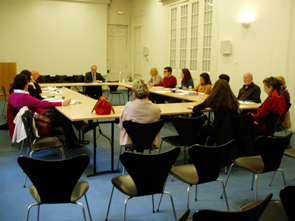 Athens MedNet
workshop – a working session
Athens MedNet
workshop – a working session
SECOND WORKING SESSION
Maria Papapavlou, University of Athens
Current research on music cultures in the Mediterranean
Marion Krüger, University of Tubingen
Flamenco between arts, ritual body practice and identity politics
ROUND TABLE
Emerging Perspectives in the Anthropology of the Mediterranean Area
Chair: Maria Couroucli, French School at Athens.
Participants: Lily Stylianoudi, Academy of Athens. Paul Clough, University of Malta. Gerasimos Makris, Panteion
University, Athens
THIRD WORKING SESSION
Francesco LaRocca, University of Catania
Intangible Heritage, an Italian experience
Eva Carlestal, Linkoping University, Sweden
Processes of place making
Antonio M. Pusceddu, University of Sienna
Connecting experiences and places: social poetics of change
in an Epirote village
FOURTH WORKING SESSION
Marina Petronoti, Research Center for Social Science, Athens
Body culture and the politics of representation
Paul Clough, University of Malta
The management of African immigrants at a large Open Center:
Cultural brokerage and multi-cultural learning in Malta
FIFTH WORKING SESSION
Andromachi Oikonomou, Academy of Athens
Anthropological approaches to material culture
in a Mediterranean context: a Greek point of view
Katerina Seraïdari, Centre d’anthropologie sociale, Toulouse
Religion in the anthropology of Greece: A neglected object of study?
Eugenia Roussou, University College, London
Orthodoxy at the Crossroads: Religious Pluralism in the Greek ‘evil eye’
SIXTH WORKING SESSION
Sina Lucia Kottmann, University of Tubingen
Where cultures and religions of the Mediterranean meet: playful and serious staging of the Own and the Other on
Spain's borders to Morocco
Carlo Capello, University of Turin
Al ‘Aql wa al Nafs: Embodiment, Anthropopoiesis and Religion in Morocco
 Athens
MedNet workshop – visit to Delphi
Athens
MedNet workshop – visit to Delphi
EXCURSION TO DELPHI
Guided tour of the Archeological Site and the Museum of Delphi lead by Prof. Dominique Mulliez, the Director of the French School at Athens.
Organisers:
Jutta Lauth Bacas, Academy of Athens
William Kavanagh, CEU San Pablo University, Madrid
Local Organiser:
Maria Couroucli, CNRS and the French School at Athens
Participants
Maria Belioti, General Archives of the State, Nauplio
Jutta Lauth Bacas, Academy of Athens
Carlo Capello, University of Turin
Eva Carlestal, Linkoping University Sweden
Paul Clough, University of Malta
Maria Couroucli, French School at Athens
William Kavanagh, CEU San Pablo University, Madrid
Sina Lucia Kottmann, University of Tubingen
Marion Krüger, University of Tubingen
Francesco LaRocca, University of Catania
Gerasimos Makris, Panteion University, Athens
Andromachi Oikonomou, Academy of Athens
Maria Papapavlou, University of Athens
Marina Petronoti, Research Center for Social Science, Athens
Antonio Pusceddu, University of Sienna
Elpida Rikou, High School of Fine Arts, Athens
Eugenia Roussou, University College, London
Katerina Seraïdari, Centre d’anthropologie sociale, Toulouse
Lily Stylianoudi, Academy of Athens
A selection of papers presented during the MedNet Athens workshop will be published as a special volume of the Journal of Mediterranean Studies with guest editors William Kavanagh and Jutta Lauth Bacas.
Anthropological Views on Migration in the Mediterranean Area
1st workshop of the EASA Mediterraneanist Network
Catania, 2nd – 4 th November 2007
 Catania MedNet
workshop: keynote speaker Professor Jeremy Boissevain
Catania MedNet
workshop: keynote speaker Professor Jeremy Boissevain
Keynote speaker: Professor Jeremy Boissevain
At the MedNet business meeting held on 19 September 2006 during the EASA conference at Bristol , it was suggested that MedNet organise a workshop during 2007 where members could present aspects of their ongoing research projects and discuss them with other social anthropologists doing research in the countries surrounding the Mediterranean Sea . This meeting – with the general title of ‘Anthropological Views on Migration in the Mediterranean Area' – was held at Catania, Sicily from 2- 4 November 2007 , hosted by C.E.M.D.A.I. , the centre for Mediterranean study of the University of Catania, whose director, Francesco La Rocca, very ably organised local arrangements for the celebration of a most successful workshop. The programme of the meeting was as follows:
OPENING SESSION
William Kavanagh, CEU San Pablo University , Madrid
Introduction
KEYNOTE SPEAKER
Jeremy Boissevain, University of Amsterdam
Some of the Consequences of Tourism in Malta , 1960-2006
FIRST WORKING SESSION
Francesco La Rocca, University of Catania
The Sicilian bridge: Sicilians between nostalgia and globalization
David Zammit, University of Malta
Refugees in Limbo: Managing Time in Maltese Refugee Reception
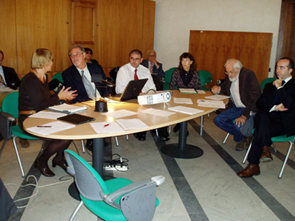 Catania MedNet workshop: one of the
working sessions
Catania MedNet workshop: one of the
working sessions
SECOND WORKING SESSION
Moshe Shokeid, University of Tel Aviv
Jewish Immigrants from the Atlas Mountains and from Ethiopia : Destinies Apart
Dorothee Louise Zinn, University of Basilicata
Immigration in Italy : The View from Immigrant Writings
Rino Fichera, University of Catania
Immigration and health problems:Experiences and trends on Immigration, asylum seekers, sans- papiers and
hints for improving related strategies
Carlo Cappello, University of Catania
Illegality and Immigration
THIRD WORKING SESSION
Jutta Lauth Bacas, Academy of Athens , Greece
Managing irregular immigration by sea in Greece
Annamaria Amitrano, University of Palermo
Human rights and compatibles developments
Elisabetta Di Giovanni, University of Palermo
Rom community in Palermo : not-inclusive dynamics
Paolo Palmeri, University of Rome
Globalization and illegal flows in Italy
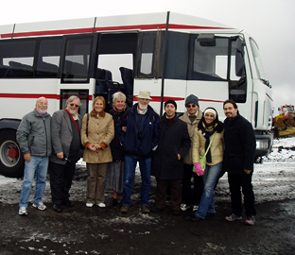 Catania MedNet workshop: excursion to Mount Etna
Catania MedNet workshop: excursion to Mount Etna
EXCURSION TO MOUNT ETNA
Organized by the CEMDAI Center for Mediterranean Study
Organisers
Jutta Lauth Bacas, Athens ; William Kavanagh, Madrid
Local Organiser
Francesco La Rocca, Catania
Participants
Annamaria Amitrano, Palermo
Jutta Lauth Bacas, Athens
Jeremy Boissevain, Amsterdam
Carlo Cappello, Catania
Giampaolo Catelli, Catania
Elisabetta Di Giovanni, Palermo
Rino Fichera, Palermo
Francesco La Rocca, Catania
William Kavanagh, Madrid
Paolo Palmeri, Rome
Moshe Shokeid, Tel Aviv
David Zammit, Malta
Dorothee Lousie Zinn, Basilicata






